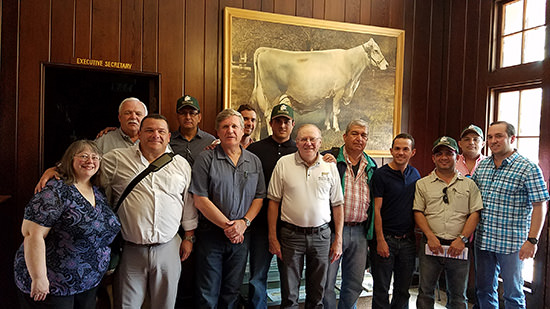National Office Hosts International Guests

By Rebekah Bovee
A group of eight Nicaraguan cattle experts, including cattle breeders/a milk cooperative director/an A.I. representative/and an Agricultural Specialist from USDA-FAS in Nicaragua, visited the Brown Swiss Association office on Friday, August 26, 2016, as part of a Cochran Fellowship activity, a program supported through USLGE and USDA-FAS. The training program was conducted by Martin Sieber, USLGE representative, assisted by a translator from Madison, Wisconsin. The group was in the US for both beef and dairy educational experience.
Nicaragua has a tropical environment – 90-110 degrees in summer and humid. There are a lot of trees, however, and natural shade is the cooling system for their cattle. Beef, dairy, peanuts, and sugar cane are the main industries. About 60% of their national income derives from either beef or dairy cows. Nicaragua’s biggest export is beef. They also export cheese to other Central American countries.
There are about five million head of beef and dairy cattle in Nicaragua, with 60-80% having varying levels of Brown Swiss in their genetics. Brown Swiss crossbreeding is prevalent with Brahman and Gyr. Including Brown Swiss genetics into the cattle population increased carcass weight 30 lbs. Cattle are mostly dual-purpose.
The largest Brown Swiss herd has about 800 head. Average herd size is about 80-100 head. Breeders are still hand milking, and only about 5% use artificial insemination on their herds, the rest use herd bulls for natural service.
There are two large milk co-ops in Nicaragua. The represented milk co-op has 1300 members which includes about 130,000 cows. They are paid by milk quality and praised the value of Brown Swiss milk – especially the fat and protein levels of milk compared to Holstein for processed milk products.
Semen companies represented in Nicaragua are: Select Sires, Semex, Sexing Technologies, CRI, Accelerated, and New Generation Genetics. About 55% of cattle semen imported into Nicaragua is Brown Swiss.
Breeders are interested in using some older genetics to catch up gradually to newer genetics. Definite interest exists for importing bull calves. As genetics improve in the better herds, there will be a trickle-down effect as resulting bull calves are sold to neighboring ranches.
There is a great deal of interest in conducting research on Brown Swiss/Gyr crosses and the group would encourage research by universities on animal health, adaptability to climate, longer productive life, and better feet & legs for grazing compared to Holsteins. Getting this type of research in print will benefit many breeders in the USA and all of Central America.
The Brown Swiss Association staff were excited to welcome this enthusiastic group from Nicaragua and begin a relationship which could be advantageous to all.